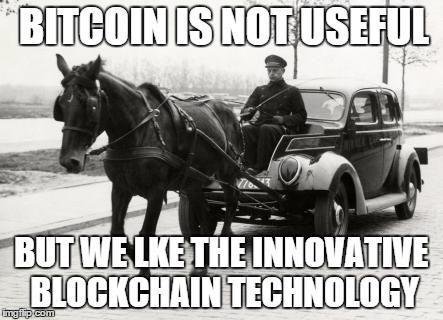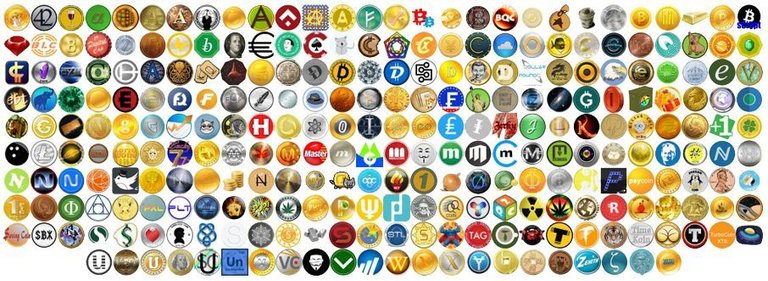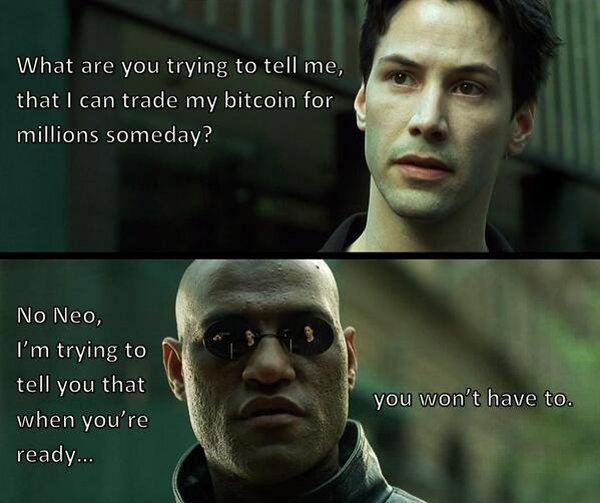
In this three-part articles, I will talk about the cryptocurrency ecosystem. This first part is dedicaded to some overall aspects of the ecosystem; the second one is about the main framework and methodology used behind the design of an altcoin/crypto project; the third one will be about the rising role of exchanges.
If we listen to the tech and business media talking about the promises of Bitcoin and blockchains, they make us we feel that, at best, we have to wait this messianic future to come; at worst, that all these promises are mainly in the hands of the enterprise sector that will disrupt themselves with the use of ‘blockchain technology’. The reality is much more radical: ‘It is already happening’ to whoever wants to see it.
Nevertheless, this new reality does not happen at a scale that would disrupt all industries yet. To be aware of this new paradigm, we must firstly abandon the blinders of the analysis that focuses solely on Blockchain, that is the favourite approach of the media.
Forget about the blockchain technology. Observe the cryptocurrency ecosystem
Indeed, trying to understand the Bitcoin revolution through a cold analysis of the use cases of the Blockchain is a bit like talking about the use cases of the database and servers technology to explain the Internet revolution. It is awkward.

If this techno centered approach is bad it is because it tends to omit two fundamental elements brought by Bitcoin:
- The questioning of the monetary and financial system (too embarrassing to discuss for companies built on them) and yet it is THE primary mission of the Bitcoin protocol
- All the creative ecosystem that Bitcoin has generated which may be indeed a bit too radical for media
This second aspect is essential because the magnitude of a revolution (even a technological revolution) can only be truly understood not by its use cases but mainly by the culture and practices that comes from it.

History is there to testify. How many people in your circle can for example explain the technical functioning of TCP/IP, SMTP or HTTP? Very little isn’t it? Yet these tedious to explain protocols are at the heart of what is called Internet and enabled an entire ecosystem and a specific culture to emerge. The Bitcoin protocol is no exception.
A much more radical form of entrepreneurship is emerging in the cryptocurrency ecosystem
Today the front line of the digital economy is defined by the entrepreneurial ecosystem that is built around a mindset and practices directly inspired by the methodologies used by the best US startups.
But then without warning, Bitcoin has generated a crypto-currencies ecosystem in which participants have a relatively different mindset and an entrepreneurial methodology inspired by the singular practices that led to the success of Bitcoin.
Discovering some aspects of this one of a kind ecosystem
What is fabulous is that Bitcoin is not the center of the ecosystem it has generated and this is because decentralization is its cardinal value. The community self-federates around the crypto-currency creation and decentralized organizations which are based on Bitcoin protocol (public blockchain & distributed consensus).

An ecosystem without defined physical location. Unlike Silicon Valley that catalyzes the startups ecosystem, and all other major cities in the world that try to do the same, there are no region or city that is the place to be for Bitcoin enthusiasts. They simply are everywhere, and they don’t necessarily need to be in a specific place as most of them work remotely. Yes, decentralisation is key!
BitcoinTalk.org, the reference website for altcoins. This platform is to the altcoins ecosystem what HackerNews was to the startups ecosystem in its infancy: A forum that seems to be dig up from the 90’s but where the best hackers / entrepreneurs come to present their projects. Of course, you’ll only find crypto projects on bitcointalk.
Money creation for all. At first glance, the uninitiated would think that this is just a community that develops monkey currencies hoping to replicate the success of Bitcoin. But taking a step back, imagine what it means to see people creating monetary systems from scratch by duplicating the Bitcoin protocol. What was the preserve of the banking system is now in the hands of all.
The outlines of the projects that are launched go well beyond the startup as we know. These projects are structured as protean organizations. They are not necessarily startups (in business sense) but they are human (so far) organizations in the broadest sense and therefore encompasses:
- pursuit of individual profit (startup model)
- voluntary participation in a common project (non profit model)
- joining a radical vision of society (political party model)
A laboratory for new forms of organization. This ecosystem is a laboratory for new forms of work, organization, financing, social interactions, economic exchange, governance. In short, more than a new ecosystem of startups, this is a laboratory where new forms of society is tested.

An under-publicized ecosystem. To summarize, here are the 2 reasons that explained why it is under-publicized:
- The media and the public are still struggling to conceive that money creation is within everyone’s reach
- The ecosystem itself is difficult to understand (not localizable, protean structure and community members who are not necessarily looking to be publicized)
However anyone who really wants to understand the scope of Bitcoin and blockchains must keep an opened eye on what is happening in the altcoins ecosystem.
Thanks a lot for reading :-) In the second part called "The Nakamoto Methodology" I will focus more on the methodology commonly used to launch a crypto project. By the way, so far I wrote about entrepreneurship, steemit, science, so don't hesitate to follow me or to comment, I would really appreciate it (and sorry if you notice some mistake, not native english speaker here) :-)
Jako
great post. i especially like the hackernews - bitcointalk.org analogy
Thank you Ntomaino ^^
Disclaimer: I am just a bot trying to be helpful.